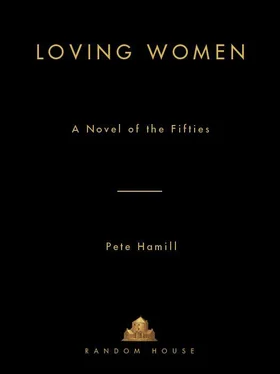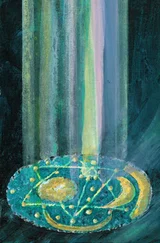And then the swamp was gone and the bus moved into a zone of luminous blond light. The earth itself was lighter, sandier, the grass bleached, and I began to see houses off in the distance, made of silvery unpainted boards, with plumes of blue smoke drifting up from brick chimneys. In the lee of a small hill, three crumpled-looking cows lay under a giant shade tree and beyond them a white boy galloped bareback on a chestnut horse.
I had no sense that any of these things were real. The woman who had sat beside me in the night: Was she real? And were these real rivers and trees and swamps and insects, real shacks and cows and horses? I wished I could stop the bus and wander around in this strange new morning world. This South. Wander until I’d found her. Please stop the bus, driver. Let me touch the South. Let me find my woman . I wanted to see it with her, understand it, read books and maps, ask a million questions, find out the names of the trees and the towns and the people. I wanted to know what armies had fought across the landscape and who the heroes were. And the villains. And the explorers. And the wild men. The South. I’m in the South .
I swore that I would find her. Track her down. Discover where she got off and retrace the steps. Just like a detective. Like Canyon. Or Buz Sawyer. Like Holmes or Philip Marlowe. Ask people and describe her. And finally meet her at dusk somewhere, and she’ll say, How old are you? And I’ll say, Old enough . And she’ll say, Don’t you have a woman back home? And I’ll say, Not anymore . And she’ll say, Well, you might as well spend the night . Yes. Like that.
Then up ahead there was a gigantic brightening, the sky suddenly fuller and whiter. The bus heaved up a long sloping rise and the trees became sparse and then at the crest of the rise I could see the land falling away for miles, and the smudged air of many chimneys and the first gas station and a restaurant called Mom’s and a sign saying BAIT and then groups of Negroes, men and women, walking along the sides of the road and cars falling in behind the bus and flatbed trucks moving toward us in the other lane. I opened the bus window and was slapped by a hot, damp wind. And then, beyond the buildings and the smoke and the scrubby mottled surface of the land, out past the trucks and the Negroes, I could see the wide blue waters of the Gulf.
“Well,” Turner said, standing in the aisle beside me, stretching the muscles of his face, cracking his knuckles, “we’re here.”
One night, after we had made love, my third wife asked me how many women I’d slept with, and I laughed and said she didn’t want to know. Turning in fury, slamming the pillow, she insisted. She was in the stage of our marriage when she was demanding some abstraction called intimacy, the most favored word that year of women’s magazines and the self-help industry. “If you don’t tell me,” she hissed, “I’ll never ever know you.” Rose had a genius for making small talk seem like a stickup. I reached for a cigarette and sighed and started to calculate. But my long pause filled her with the grief she must have been seeking; she sobbed, she cursed, she pulled a pillow over her head. And I tried to remember all those faces, the blurred flesh of three decades and five continents, blond hair and brown, pale skin and olive, bodies thin and thick. Furious, she got up, slamming the door on her way to the bathroom, and was gone a long time, and when she came back, I said I thought the number was around twelve hundred. But then, I added, I couldn’t be expected to remember everything. She fell back as if wounded and lay in a theatrical state of trembling shock. I knew almost immediately that I should have lied; some truths are always unacceptable. To say that she had asked for this information — had demanded it — wasn’t sufficient excuse. Actually telling her was cruel, even stupid. So then I lied. In the name of peace. I told her that I was only kidding, that I’d slept with only twenty-odd women, including wives, and none were as good as Rose was in bed and she smiled through tears and looked grateful and in an hour was talking about Elizabeth Taylor’s diet. But as I lay beside her in the dark, and then made love to her again (another lie), with my brain flooding with the images of other women, I remembered the first. The woman I’d seen so briefly on a bus. The woman named Eden Santana. And tonight, close to the Gulf again, I am full of the aching loneliness I felt the first time I thought I had lost her forever. Eden Santana.
We had arrived in Pensacola at last, the bright sun hurting my eyes. There was no bus station. The Greyhound pulled up at a curb and I saw signs telling me I was on the corner of Garden Street and North Palafox. “Pensacola, folks,” the driver said, and there was a wheeze of doors opening and then people were pulling luggage from racks. Turner went ahead. I stopped and talked to the driver.
“There was a woman sitting beside me,” I said. “Got on in Atlanta, got off somewhere between there and here.”
“White woman?”
“Yeah.”
“I remember. Yeah. Pretty woman. Got off with some cullid folks in, oh, hell, musta been Palatka.”
“Where’s that?”
“Oh, fipty mile back. She figget somethin?”
“No. Nothing. I was just …”
He smiled. “She was a looker, awright.”
“Yeah.”
That was all. I’d met her, felt her body against mine, was sure somehow that she had touched me in the night, felt all other women vanish from me, felt all things to be possible; and she was gone. In some place called Palatka. I got off and saw Turner drinking from a water fountain shoved against a wall in the shade. It was marked “White.” The water dribbled steadily into a white ceramic dish. A pipe ran five feet from the white fountain to the right, connecting to a smaller fountain labeled “Colored.” None of the Negroes used their fountain.
“Taste like seawater,” Turner said, pulling a face. “Maybe they’re tryin to get us feelin at home.”
“Should I try it?”
“Seawater drives you crazy, sailor.”
“I guess I’ll wait.”
“You can watch a while and see if I go crazy.”
“By then I’ll be dead of thirst.”
The local buses were around the corner of Palafox, engines idling in the sun. A group of sailors waited in single file to board a bus marked Mainside. The Greyhound driver came around the corner with a bundle of copies of the Atlanta Constitution and dropped them in the lobby of a movie theater called the Rex. The Glass Menagerie was on the marquee, but the doors were locked, the box office dark.
“Well, I’ll see you, Devlin,” Turner said. “There must be another bus goes to Ellyson. I gotta jump this one to Mainside.”
I told him I would see him around and we shook hands and said good-bye. I felt strange. I’d heard about the man’s wives on the long ride. I’d drunk his whiskey. Now he was vanishing. Just like that. And I thought that as I went around in the world more and more people were like characters in movies: You saw them on the screen, you got to know them, and then they were gone. Turner was like that. And the woman with the curly hair. All the guys from boot camp. The guys I knew in high school. Buddies to the death. And then gone. At the door of the Mainside bus, Turner shook my hand, nodded good-bye, then turned on the steps and said, “Happy New Year.”
I waved, and the Mainside bus pulled away from the curb and moved out of sight. I stood there alone for a long while. Tonight, arriving here for the first time in more than thirty years, I drove into the center of Pensacola again, to get my bearings, and found that exact spot. I was thrown instantly back into that first day-bright arrival when I was some other person. Neat careful rows of palm trees seemed to be at parade rest all the way up the broad sloping street. About four blocks up, I could see three churches plugging the avenue, staring down at the town in a gloomy stone-faced way. They gave me a chilly moment, pebbling my skin; in 1953, churches always seemed to be saying No . So I turned my back on them that morning and looked around the empty sunbaked corner. There was a hotel called the San Carlos across the street, and as I waited for the Ellyson bus I counted floors. I did the same thing again tonight, gazing up at the shuttered hotel, its boarded doors and begrimed windows. Nine stories, including the ground floor. Tonight a wino slept where a Negro doorman in a white uniform once stood on the steps. There was a bar and restaurant on either side of the entrance; the polished glass of both were now hidden behind sheets of plywood. A thick-bodied man in a sleeveless undershirt stared out a third-floor window that first day, and though back then there were few other signs of life, tonight there were none at all. That first day in Pensacola, I thought the usual guests must all be home for the holidays, sleeping off hangovers, getting laid. Tonight I thought they must all be dead.
Читать дальше












